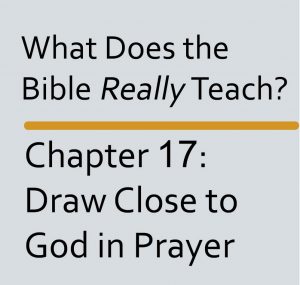“Bible Teach,” Chapter 17, paragraph 11 (pp. 168) says that “we may pray for anything that is in harmony with God’s will” and that “we may speak openly, ‘pouring out our heart’ to God.
You might point out that the two aren’t always consistent.
Consider Moses’ complaint to God in Exodus 5:22-23: “Then Moses turned to Jehovah and said: ‘Jehovah, why have you afflicted this people? Why have you sent me? From the time that I went in before Pharaoh to speak in your name, he has dealt worse with this people, and you have certainly not rescued your people.”
Was that praying in harmony with God’s will? Wasn’t it rather pouring out his heart?
Citing Jesus’ model prayer, paragraph 12 (p. 169) says, “Matters relating to Jehovah God should be given first importance in our prayers. We certainly have reason to express heartfelt praise and thanks to him for all his goodness.”
This is true, but you might point out that we need to be careful not to turn the model prayer into a formula that makes our prayers repetitive and insincere in an attempt to be “theologically correct.”
Paragraph 13 (p. 169) states:
The Bible does not place any limit on how long private or public prayers should be. They may range from a brief prayer before a meal to a long private prayer in which we pour out our heart to Jehovah. (1 Samuel 1:12, 15) However, Jesus condemned self-righteous individuals who made long, showy prayers before others. (Luke 20:46, 47) Such prayers do not impress Jehovah. What is important is that we pray from our heart. Hence, the length of acceptable prayers may vary according to needs and circumstances.
We don’t always have to disagree with the Watchtower. I would probably surprise the Witnesses by saying, “I agree wholeheartedly with everything that paragraph says.”
I would try to connect with them on a personal level by asking them, “Do you personally find it challenging to pray in public? I know I do. Because I know other people are listening, I find myself wondering what they think of my prayer. When that happens, I find I’m not really focused on God.”
I would also agree with the statements in paragraph 14 (p. 170):
The Bible encourages us to “pray continually,” to “persevere in prayer,” and to “pray constantly”… Of course, these statements do not mean that we must be praying to Jehovah every moment of the day. Rather, the Bible is urging us to pray regularly, continually thanking Jehovah for his goodness to us and looking to him for guidance, comfort, and strength. Is it not comforting to know that Jehovah puts no limit on how long or how often we can talk to him in prayer? If we truly appreciate the privilege of prayer, we will find many opportunities to pray to our heavenly Father.
Paragraph 15 (p. 170) says that we should say “Amen” at the end of prayers, because that word means “surely” or “so be it.”
My response would be, “I’m certainly not against saying ‘Amen’ at the end of prayers. In fact, everyone I know does that. But sometimes I think we turn that into a formula and think that we haven’t really ended our prayers unless we say that particular word.”
Answers to prayer
Paragraph 17 (p. 171) claims, “Jehovah uses his angels and his earthly servants to answer prayers… There have been many experiences of individuals who prayed to God for help to understand the Bible and were soon thereafter contacted by one of Jehovah’s servants. Such experiences give evidence of angelic direction of the Kingdom-preaching work.”
I would challenge that statement by saying, “People have had similar experiences with regard to other religions. For example, I am not a Mormon, but I have heard the testimony of someone who joined the Mormon church because their missionaries showed up at their door right after they had prayed for guidance. Is that likewise evidence of angelic direction of the Mormon church?”
Paragraph 18 (p. 172) says that Jehovah “may answer our prayers for help to cope with trials by giving us guidance and strength by means of his holy spirit.”
I would ask, “How could an impersonal force give people guidance and strength?”
If you haven’t already done so, you could use The Holy Spirit is God Approach from my book, Getting Through to Jehovah’s Witnesses: Approaching Bible Discussions in Unexpected Ways, to show the Witnesses many scriptures that indicate that the Holy Spirit does things only a person with a mind, will, and emotions can do.
Paragraph 18 (p. 172) also says, “Helpful scriptures may be found during our personal Bible study and as we read Christian publications, such as this book. Scriptural points that we need to consider may be brought to our attention by what is said at a Christian meeting or through the comments of a concerned elder in the congregation.”
Notice the implication that such guidance can only come through the auspices of the Watchtower organization. You might ask the Witnesses if they think such insights can ever come through reading the literature or attending meetings of groups other than Jehovah’s Witnesses.
Next week, we will move on to “Bible Teach,” Chapter 18—“Baptism and Your Relationship with God.”


Leave a Reply
2 Comments on "Praying and Getting Answers"
Thank you! I’m glad you got out of the Watchtower and found Jesus!